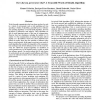3092 search results - page 14 / 619 » Where are you pointing |
SYNTHESE
2010
13 years 5 months ago
2010
: Some intuitive normative principles raise vexing „detaching problems‟ by their failure to license modus ponens. I examine three such principles (a self-reliance principle and...
DASFAA
2009
IEEE
14 years 2 months ago
2009
IEEE
In recent years, data provenance or lineage tracing which refers to the process of tracing the sources of data, data movement between databases, and annotations written for data ha...
PLDI
2009
ACM
14 years 2 months ago
2009
ACM
Program errors are a source of information leaks. Tracking these leaks is hard because error propagation breaks out of program structure. Programming languages often feature excep...
CCS
2009
ACM
14 years 2 months ago
2009
ACM
Third-party cloud computing represents the promise of outsourcing as applied to computation. Services, such as Microsoft’s Azure and Amazon’s EC2, allow users to instantiate v...
CSE
2009
IEEE
14 years 2 months ago
2009
IEEE
Word-of-mouth communication has been shown to play a key role in a variety of environments such as viral marketing and virus spreading. A family of algorithms, generally known as ...

